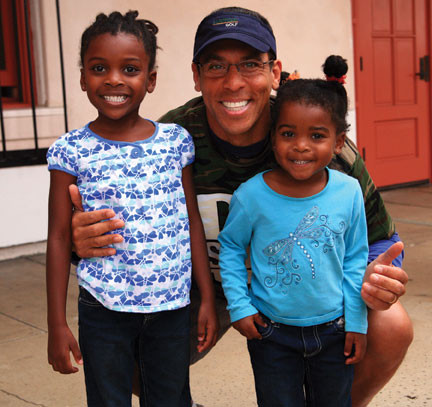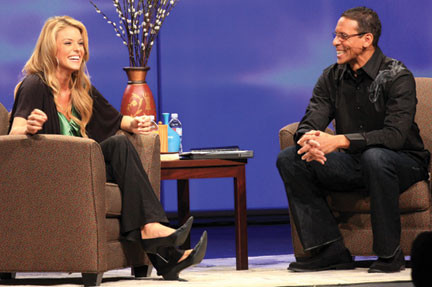Miles McPherson, the senior pastor of The Rock Church in San Diego, California, leads a congregation deeply committed to both spiritual growth and community transformation. His journey from a professional football player to a prominent religious leader is as compelling as the church’s innovative approach to ministry and social engagement. This article delves into the heart of The Rock Church San Diego, exploring its origins, its impactful “DO Something” initiative, and its unwavering stance on faith in the modern cultural landscape.
Miles McPherson’s life story is one of remarkable transformation. Decades ago, McPherson, then a player for the San Diego Chargers, lived a life far removed from his current pastoral role. “I was smoking marijuana and having sex and all that kind of stuff,” he candidly admits, reflecting on his pre-Christian lifestyle. His initial encounter with the Gospel in 1979 was a seed planted, but it wasn’t until years later, amidst the pressures of professional football, that it truly took root.
It was the consistent Christian example of teammates Sherman Smith and Ray Preston that profoundly impacted McPherson. He observed their sincere faith in action, recognizing a void in his own life. “During the five years I walked away from the Lord, he was telling me every day, when you’re ready I’ll get you off drugs, you’ll marry your girlfriend,” McPherson recalls. April 24, 1984, marked a turning point. Tired of his lifestyle, including a year and a half of cocaine use, McPherson made a definitive commitment to Christ. That day, he stopped using cocaine, ceased cursing, and recommitted to Debbie, his girlfriend who would later become his wife.
 Miles McPherson, senior pastor, The Rock Church, San Diego, CA
Miles McPherson, senior pastor, The Rock Church, San Diego, CA
Debbie’s own faith journey soon followed, witnessing the transformative power of God in Miles’s life and embracing Christianity herself. Their marriage, now spanning over 25 years at the time of the original interview, stands as a testament to their shared faith and commitment.
The Rock Church San Diego is not just a place of worship; it’s a hub of proactive community engagement, largely driven by its “DO Something” initiative. Far from being a separate ministry, “DO Something” is integral to the church’s identity, encouraging every member to actively contribute to their city. This commitment is quantified in staggering numbers: in the year of the interview, the church pledged 600,000 hours of community service, a monthly target of 50,000 hours.
This massive volunteer effort isn’t undirected. A significant portion, 100,000 hours, is channeled towards projects specifically designated by the Mayor of San Diego, demonstrating a collaborative partnership between The Rock Church and city leadership. By meticulously tracking and reporting these volunteer hours, the church aims to showcase its tangible contribution to the city, effectively saving taxpayer money and acting as a valuable community asset.

The vision extends beyond San Diego. McPherson envisions a “DO Something church network,” inspiring other congregations to replicate this model of community involvement. The scope of their outreach is broad and diverse, encompassing ministries to individuals in the adult entertainment industry, care for residents in convalescent homes, environmental cleanup efforts, and support for the homeless and children in foster care. The soon-to-launch website, www.dosomethingworld.org, aimed to serve as a resource for churches and individuals seeking to replicate this impactful model of community service.
In an era of evolving social norms, The Rock Church San Diego navigates complex issues with a foundation rooted in biblical principles. One such area is same-sex ministry. Rather than creating a separate ministry, The Rock Church collaborates with existing local organizations, ensuring that any ministry aligns with their core theological beliefs. The overarching aim is reconciliation with God, extending love and encouragement while holding firm to biblical teachings on behavior.
This commitment to biblical principles was also evident in the church’s involvement in Proposition 8, the California ballot initiative concerning the definition of marriage. Pastor McPherson played an active role in educating not only his congregation but the wider Christian community about the biblical definition of marriage. He emphasizes that their stance was not rooted in opposition to specific groups, but rather in upholding a positive affirmation of traditional marriage as divinely ordained between a man and a woman. McPherson clarifies that just as there are numerous categories of individuals who cannot marry according to societal and biblical norms (relatives, minors, multiple partners), their position on marriage was focused on honoring God’s design, which they see as a metaphor for the relationship between Christ and the Church.
The involvement in Proposition 8 was a collaborative effort, with The Rock Church joining forces with other San Diego congregations. This coalition engaged in extensive efforts to raise awareness, gather signatures for the referendum, and mobilize voters. These initiatives included rallies, prayer meetings, and a significant day of fasting and prayer at Qualcomm Stadium, drawing 33,000 participants.
The interview also touched on the controversy surrounding Carrie Prejean, a member of The Rock Church who gained national attention for her answer regarding marriage in the Miss USA pageant. McPherson’s support for Prejean highlights the church’s broader stance on standing firm for Christian convictions even amidst cultural opposition. He met Prejean shortly after the pageant and offered her guidance and support as she faced criticism for her views.
McPherson sees the Prejean incident and the Proposition 8 debates as indicative of a growing cultural opposition to biblical values. He believes Christians must be prepared for confrontation and even persecution as they stand for their faith. He calls for a new generation of Christians and pastors willing to uphold the word of God despite societal pressures and criticism, urging believers to prioritize God’s approval over the fear of conflict or political correctness. He emphasizes the importance of not being intimidated into silence when facing challenges to Christian beliefs, even in everyday situations like school or public discourse.
McPherson directly addresses the concept of tolerance, arguing that those who demand tolerance are often the most intolerant themselves. He encourages Christians to recognize this double standard and to confidently articulate their beliefs while holding others accountable to the very tolerance they preach. He views the cultural challenges not merely as political or societal issues but as spiritual warfare, recognizing Satan as the ultimate adversary seeking to undermine God’s truth.
Drawing parallels between his football career and pastoral leadership, McPherson highlights the lessons of resilience, teamwork, and commitment he learned on the field. Just as football demanded perseverance through pain and unwavering dedication to the team’s goals, he sees ministry as a battle for people’s lives, requiring similar dedication and a rejection of complacency. He emphasizes that The Rock Church is not simply “playing church” but actively engaging in real-world ministry, driven by a commitment to fulfilling God’s call and impacting lives. The church’s website, www.therocksandiego.org, serves as a testament to the diverse and impactful ministries undertaken by The Rock Church and its members.
The interview concludes with the empowering acronym S.T.A.N.D., encapsulating McPherson’s message of courageous faith: Stare down courage, Trust in the truth and never lie, Accept God’s sovereign provision, Never fear man, Die to your self. This call to action resonates with the spirit of The Rock Church San Diego, a community dedicated to living out their faith boldly and transforming their city through active service and unwavering conviction.